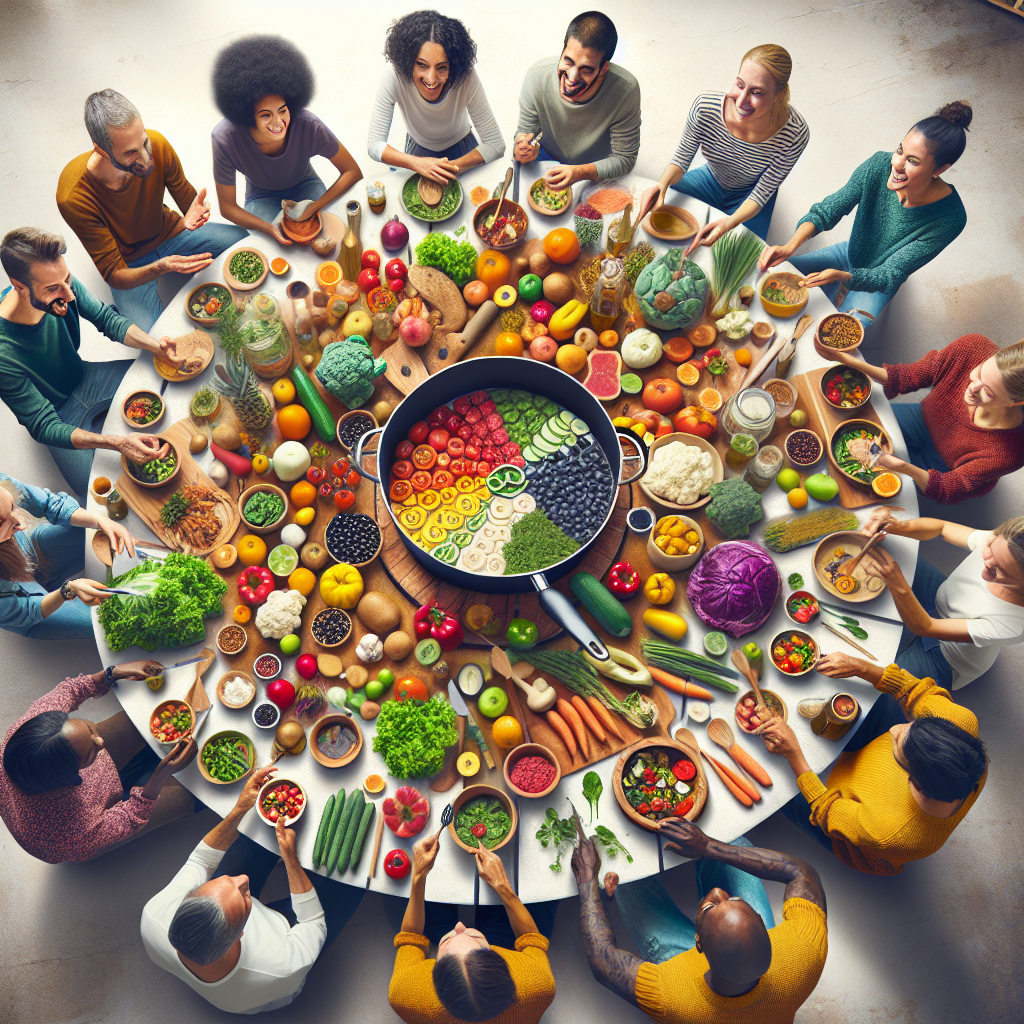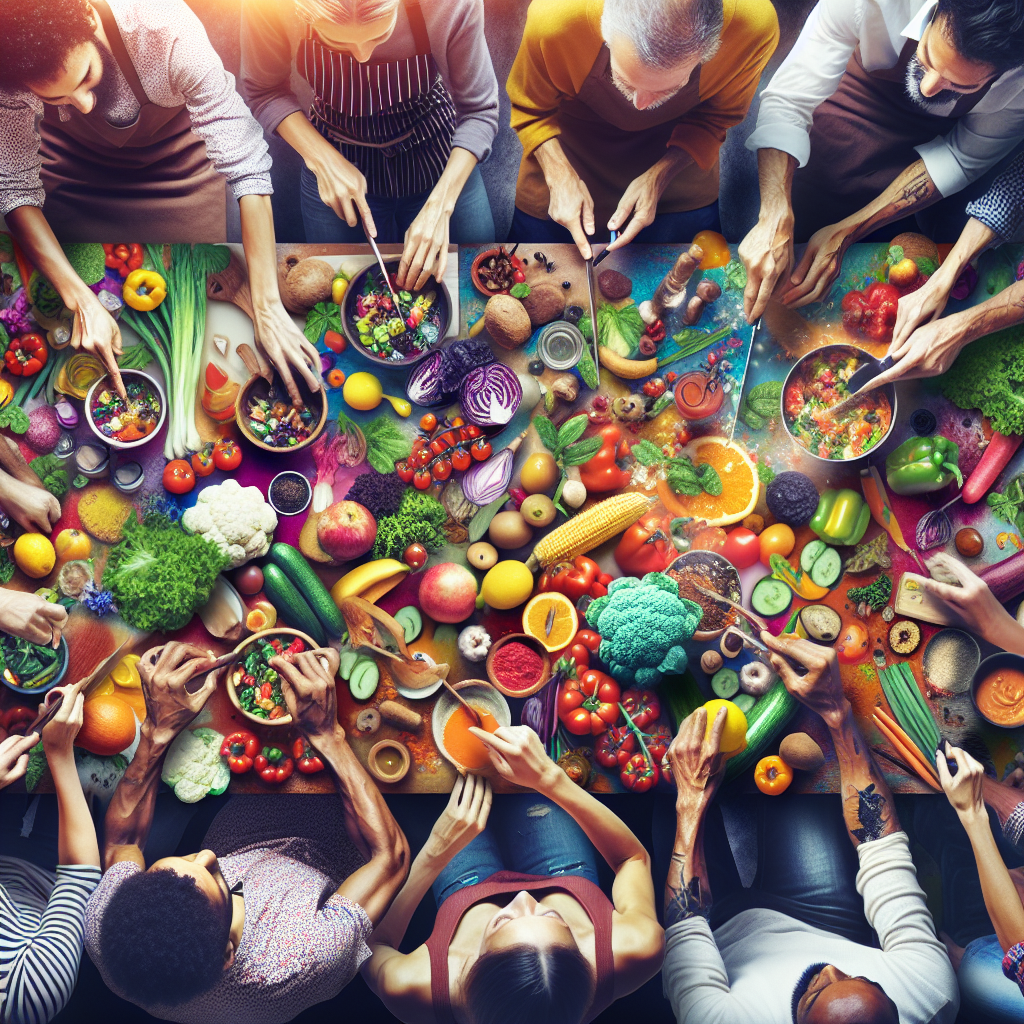At Vegan Workshops, we provide a nourishing space for individuals to explore the exciting world of plant-based living. Through interactive sessions and hands-on experiences, participants are empowered to embrace a cruelty-free lifestyle while gaining invaluable knowledge about vegan cooking, nutrition, and compassionate living. Join us as we embark on a journey towards a healthier, more sustainable future, one delectable dish at a time.

What are Vegan Workshops?
Definition and Overview
Vegan workshops are educational sessions or programs that provide participants with the knowledge and skills needed to adopt a vegan lifestyle. These workshops usually focus on various aspects of veganism, such as cooking, baking, nutrition, gardening, and meal planning. They aim to promote the benefits of a plant-based diet and help individuals make conscious choices that align with their values.
Purpose and Benefits
The purpose of vegan workshops is to empower individuals with the tools and information necessary to transition to a vegan lifestyle successfully. These workshops offer numerous benefits, including:
- Enhanced Culinary Skills: Vegan workshops provide participants with the opportunity to learn new recipes and cooking techniques that center around plant-based ingredients. By attending these workshops, individuals can expand their culinary skills and create delicious and nutritious vegan meals.
- Improved Nutrition Knowledge: Vegan workshops often include nutritional education sessions, helping participants better understand the importance of balanced vegan diets and the key nutrients to include in their meals. This knowledge can contribute to improved overall health and wellbeing.
- Support and Community: Attending vegan workshops allows individuals to connect with like-minded people and join a supportive community of vegans and aspiring vegans. These workshops can serve as a platform for individuals to share experiences, seek advice, and find encouragement on their vegan journey.
- Inspiration and Creativity: Vegan workshops encourage participants to think outside the box and explore innovative ways to incorporate plant-based ingredients into their meals. By providing inspiration and creative ideas, these workshops can help individuals break out of their culinary routines and discover new and exciting recipes.
Types of Vegan Workshops
Cooking Workshops
Cooking workshops are designed to teach participants how to prepare delicious and nutritious vegan meals. These workshops often cover topics such as knife skills, preparing plant-based proteins, and creating flavorsome sauces and dressings. Participants have the opportunity to learn from experienced chefs and gain hands-on experience in the kitchen.
Baking Workshops
Baking workshops focus on the art of vegan baking, teaching attendees how to make delectable vegan desserts, pastries, and bread. Participants learn about alternative ingredients such as plant-based milk, flax seeds, and applesauce, which can be used as substitutes in traditional baking recipes. Baking workshops often include tips for achieving the perfect texture and flavor in vegan baked goods.
Nutritional Workshops
Nutritional workshops educate participants about the importance of a well-balanced vegan diet. These workshops provide information on essential nutrients, meal planning, and meeting specific dietary needs. Participants gain a deep understanding of the nutritional aspects of veganism and learn how to optimize their health through a plant-based lifestyle.
Gardening Workshops
Gardening workshops focus on teaching participants how to grow their own fruits, vegetables, and herbs. These workshops cover topics such as soil preparation, seed starting, organic gardening techniques, and maintaining an urban garden. By learning how to grow their own produce, individuals can ensure a steady supply of fresh, organic ingredients for their vegan meals.
Meal Planning Workshops
Meal planning workshops help participants develop effective strategies for planning and preparing vegan meals throughout the week. These workshops often cover topics such as batch cooking, meal prepping, and optimizing grocery shopping. Participants learn how to save time and ensure they have nutritious meals readily available, even during busy periods.
Finding and Choosing a Vegan Workshop
Local Community Resources
To find local vegan workshops, individuals can explore community centers, local vegan groups, and health food stores. These resources often host or promote vegan workshops and can provide valuable information about upcoming events in the area. Checking bulletin boards or community websites can also help in discovering local workshops.
Online Platforms and Websites
Numerous online platforms and websites offer directories and databases of vegan workshops worldwide. Websites dedicated to promoting vegan events and resources, as well as social media platforms are great places to start searching for vegan workshops. These platforms provide comprehensive listings, and individuals can sort workshops by location, type, and date to find the most suitable options.
Reviews and Recommendations
Before choosing a vegan workshop, individuals can read reviews and seek recommendations from others who have attended similar workshops. Online forums, social media groups, and dedicated vegan websites often have discussions and testimonials that can provide valuable insights to help participants make an informed decision.
Budget Considerations
Consideration of budget is an important factor when choosing a vegan workshop. Some workshops may charge a fee for attendance, while others may be offered for free. Additionally, participants should consider any associated costs, such as transportation or purchasing ingredients/equipment required for the workshop activities. It is important to choose a workshop that aligns with their budget without compromising on the quality of the workshop offerings.
Preparing for a Vegan Workshop
Research and Familiarization
Before attending a vegan workshop, it is beneficial to research the workshop topic and the facilitator’s background. Understanding the workshop’s focus and approach allows participants to come prepared with specific questions and areas of interest. Familiarizing oneself with basic vegan cooking techniques, ingredients, and terminology can also enhance the overall workshop experience.
Gathering Necessary Equipment and Ingredients
Depending on the workshop, participants may need to bring specific equipment, such as cooking utensils, aprons, or containers to store leftovers. Additionally, it is essential to ensure that all required ingredients are readily available. Gathering the necessary equipment and ingredients in advance prevents any last-minute stress and helps participants fully engage in the workshop activities.
Mindset and Openness
Approaching a vegan workshop with an open mind and a positive attitude can greatly enhance the learning experience. Embracing new ideas, techniques, and perspectives allows participants to fully immerse themselves in the workshop and derive maximum benefit from the teachings. Having a growth mindset and being open to trying new recipes and methods can lead to exciting culinary discoveries.
Registration and Attendance
Once a suitable vegan workshop has been identified, participants should register for the workshop in advance. This ensures a place in the workshop and allows organizers to plan accordingly. It is crucial to consider the workshop’s duration and time commitment to ensure attendance is feasible. Arriving punctually and being fully present during the workshop encourages active participation and maximizes learning opportunities.

Benefits of Attending Vegan Workshops
Enhanced Culinary Skills
One of the primary benefits of attending vegan workshops is the opportunity to develop and refine culinary skills. Participants learn to experiment with different ingredients, create unique flavor profiles, and master various cooking techniques. By expanding their culinary repertoire, individuals can prepare flavorful and satisfying vegan meals for themselves and their loved ones.
Improved Nutrition Knowledge
Vegan workshops often provide in-depth education about the nutritional aspects of a plant-based diet. Participants gain a comprehensive understanding of essential nutrients, macronutrients, and the benefits of various foods. Armed with this knowledge, individuals can optimize their dietary choices, ensuring they meet their nutritional needs while adhering to a vegan lifestyle.
Support and Community
Attending vegan workshops offers the chance to connect with like-minded individuals and build a supportive network. Engaging with a community of vegans and aspiring vegans creates a sense of belonging and provides a valuable support system. Sharing experiences, challenges, and triumphs strengthens the commitment to a vegan lifestyle and fosters mutual encouragement among participants.
Inspiration and Creativity
Vegan workshops serve as a source of inspiration and encourage culinary creativity. Participants can explore innovative ways to incorporate plant-based ingredients into their meals, experimenting with different flavors, textures, and cooking techniques. The workshop environment provides a safe space for individuals to step outside their comfort zones and discover new and exciting vegan recipes.
Common Challenges in Vegan Workshops
Cost and Affordability
One of the challenges individuals may face when considering vegan workshops is the cost. Some workshops charge a fee, which may be prohibitive for those on a tight budget. However, it is worth exploring options such as community centers or free workshops organized by local vegan groups, which can provide access to informative and affordable vegan workshops.
Time Constraints
Balancing work, family responsibilities, and personal commitments can make finding time for vegan workshops a challenge. Participants must carefully consider their schedule and commitments before registering for a workshop to ensure they can fully dedicate themselves to the workshop experience. Planning, prioritizing, and making accommodations can help overcome time constraints and make attending a workshop feasible.
Ingredients Availability and Cost
Another challenge participants may encounter is the availability and cost of vegan ingredients. Depending on the location, sourcing specific vegan ingredients may be more challenging or expensive. However, with some research and creativity, alternative ingredients and local produce can be substituted to achieve similar flavors and textures. Engaging in community gardening or exploring local farmers’ markets can also assist in obtaining fresh and affordable ingredients.
Skill Level and Experience
Participants may enter a vegan workshop with varying skill levels and experience. Some may be absolute beginners, while others may have some prior knowledge or experience in vegan cooking. It is essential for workshop facilitators to strike a balance and ensure that the content is suitable for participants across different skill levels. Offering additional resources or addressing different levels during the workshop can help overcome this challenge.
Disagreements and Conflicts
During vegan workshops, differences of opinion or conflicts may arise among participants due to varying dietary preferences or personal beliefs. It is essential to approach these situations with an open mind and foster a respectful and inclusive workshop environment. Encouraging constructive dialogue, active listening, and mutual understanding can help navigate through disagreements and conflicts, ensuring a positive and enriching workshop experience for everyone involved.

Tips for Making the Most of Vegan Workshops
Active Participation and Engagement
To make the most of a vegan workshop, active participation and engagement are key. Participants should ask questions, share experiences, and actively contribute to discussions and activities. Engaging with the facilitator and other participants fosters a dynamic learning environment and encourages the exchange of ideas and perspectives.
Asking Questions and Seeking Clarification
During a vegan workshop, participants should not hesitate to ask questions and seek clarification when needed. The facilitator is there to provide guidance and support, and addressing any uncertainties or queries can enhance the learning experience. Participants should take advantage of the opportunity to gain a deeper understanding of the workshop content and ensure they can apply the knowledge effectively.
Networking and Building Connections
Attending a vegan workshop affords the opportunity to connect with others who share similar interests and goals. Participants should take advantage of networking opportunities during breaks or after the workshop sessions. Building connections with facilitators and other participants can lead to ongoing support, collaboration, and access to additional resources and information within the vegan community.
Taking Notes and Documenting Recipes
To retain the valuable information and recipes shared during workshops, participants should take notes and document the recipes demonstrated or provided. This allows for future reference and the ability to recreate dishes at home. Any additional tips, techniques, or insights gained during the workshop should also be documented to ensure they are not forgotten.
Continuing Practical Application
The true value of a vegan workshop lies in its application beyond the workshop itself. Participants should actively apply the techniques, recipes, and knowledge gained in their day-to-day lives. Experimenting with new recipes, sharing newfound skills with family and friends, and incorporating plant-based meals into regular cooking routines help solidify the learning acquired during the workshop.
Vegan Workshops for Kids and Families
Interactive and Hands-On Activities
Vegan workshops designed for kids and families often incorporate interactive and hands-on activities to engage participants of all ages. Children may have the opportunity to participate in age-appropriate cooking demonstrations or engage in sensory activities that introduce them to new flavors and ingredients. The hands-on nature of these workshops enhances the learning experience and fosters a sense of participation and enjoyment.
Educational and Fun Experience
Vegan workshops for kids and families combine education with entertainment, creating a fun and engaging learning environment. These workshops often utilize games, storytelling, and interactive demonstrations to impart knowledge about veganism and healthy eating habits. By making the workshop enjoyable and interactive, children and families are more likely to retain the information and develop a positive attitude towards veganism.
Creating Healthy Habits
Introducing children and families to vegan workshops helps establish healthy eating habits from a young age. These workshops provide a platform to learn about the benefits of whole plant-based foods, instilling an appreciation for nutritious meals. By promoting the importance of fruits, vegetables, and grains, workshops encourage families to make conscious choices that prioritize their health and wellbeing.
Quality Family Time
Participating in vegan workshops as a family allows for quality bonding time. Engaging in hands-on activities, experimenting with new recipes, and sharing the joy of cooking together creates lasting memories and strengthens family relationships. Vegan workshops provide a unique opportunity for families to unite around a shared goal and create a positive, lasting impact on their collective health and the environment.

Vegan Workshops and Sustainability
Reduced Environmental Impact
Choosing a vegan lifestyle can significantly reduce an individual’s environmental impact. Vegan workshops showcase the link between veganism and sustainability, educating participants on how plant-based diets contribute to lower greenhouse gas emissions, reduced land and water usage, and protection of biodiversity. By promoting sustainable practices, workshops inspire individuals to make conscious choices that benefit the planet.
Promoting Plant-Based Lifestyle
Vegan workshops play a crucial role in promoting a plant-based lifestyle and fostering a culture of compassion towards animals. By highlighting the benefits of choosing plant-based alternatives over animal products, workshops encourage participants to adopt a more sustainable and ethical way of living. The workshops provide the necessary knowledge and skills to transition to a plant-based lifestyle in a supportive and informative environment.
Animal Welfare Advocacy
Veganism is deeply rooted in the belief that animals should not be exploited for food, fashion, or any other purpose. Vegan workshops educate participants about animal welfare issues and the impact of animal agriculture on animal rights. By emphasizing compassion and ethical considerations, these workshops empower individuals to advocate for animal welfare and make choices that align with their values.
Health and Wellness
A plant-based diet has been associated with numerous health benefits. Vegan workshops focus on the importance of balanced nutrition and provide participants with the tools to improve their overall health and wellbeing. By making the connection between plant-based diets and reduced risk of chronic diseases, workshops inspire individuals to prioritize their health, leading to long-term lifestyle changes.
The Future of Vegan Workshops
Growing Popularity and Demand
The popularity of veganism continues to rise, reflecting an increased demand for vegan workshops. As more individuals embrace a plant-based lifestyle, the demand for educational resources, such as vegan workshops, will correspondingly increase. This growing popularity presents an exciting opportunity for the expansion and diversification of vegan workshop offerings.
Advancements in Technology
Advancements in technology have the potential to enhance the accessibility and impact of vegan workshops. Online platforms and virtual workshops allow individuals from different locations to participate in workshops without geographical limitations. Additionally, technology can facilitate the sharing of recipes, resources, and tips, creating a virtual community of individuals passionate about veganism.
Diverse and Specialized Offerings
The future of vegan workshops will likely witness a diversification of topics and specialized offerings. As veganism continues to gain mainstream recognition, workshops may cater to more specific dietary needs or niche interests within the vegan community. Participants will have the opportunity to explore topics such as raw vegan cuisine, gluten-free vegan baking, or incorporating ethical fashion into their vegan lifestyle.
Global Reach and Accessibility
With the increasing demand for vegan workshops, efforts will be made to ensure accessibility on a global scale. Workshops conducted in different languages, catered to regional cuisine, or tailored to specific cultural contexts can provide a greater inclusivity and reach a wider audience. The integration of technology in workshops also contributes to their accessibility, allowing individuals from different locations and backgrounds to benefit from the knowledge and skills imparted.
In conclusion, vegan workshops offer a valuable platform for individuals to learn and grow in their journey towards a vegan lifestyle. By providing education, hands-on experiences, and a supportive community, these workshops empower participants to make informed choices and embrace a compassionate, sustainable, and healthy way of living. With their numerous benefits and growing popularity, vegan workshops are undoubtedly shaping the future of plant-based living.





